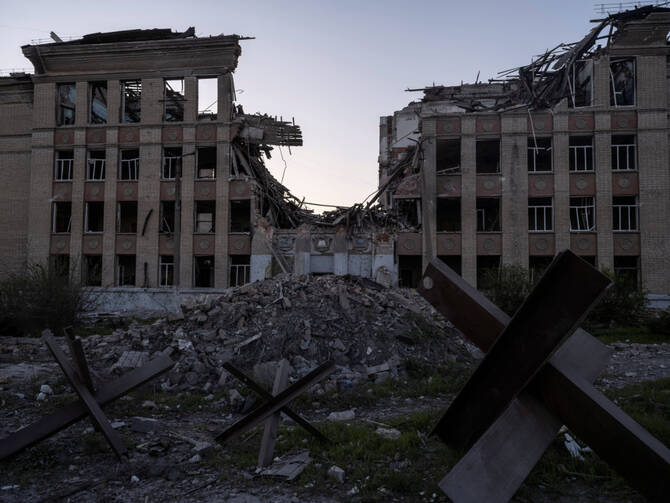KRAMATORSK: Russia and Ukraine on Sunday accused each other of violating an Easter truce announced by Russian President Vladimir Putin.
The 30-hour truce had been meant to start Saturday to mark the religious holiday, but Ukraine’s President Volodymyr Zelensky accused Russia of keeping up its attacks on the front line.
Ukraine’s forces reported 2,935 violations of Russia’s own Easter ceasefire vow, Zelensky said early on Monday.
“The nature of Ukrainian actions will continue to be mirrored: we will respond to silence with silence, our strikes will be to protect against Russian strikes,” he said in a post on the Telegram messaging app.
Zelensky also renewed a proposal for a 30-day truce.
Moscow said it had “repelled” assaults by Ukraine and accused Kyiv of launching hundreds of drones and shells, causing civilian casualties.
“Despite the announcement of the Easter truce, Ukrainian units at night made attempts to attack” Russia’s positions in the Donetsk region, its defense ministry added.
Russian troops had “strictly observed the ceasefire,” the defense ministry insisted.
Rescue services in the eastern town of Kostyantynivka said they had recovered the bodies of a man and a woman from the ruins of building hit the previous day by Russian shelling.
The Russian-appointed mayor of Gorlovka in occupied Donetsk, Ivan Prikhodko, said two civilians had been wounded there, without giving details.
Russia launched a full-scale invasion of Ukraine in February 2022 and now occupies around 20 percent of the country.
Putin’s order to halt all combat over the Easter weekend came after months of efforts by US President Donald Trump to get the war rivals to agree to a ceasefire.
But on Friday, Trump threatened to withdraw from talks if no progress was made.
Ukrainian soldiers told AFP that they had noticed a lull in fighting.
A drone unit commander said that Russia’s activity had “significantly decreased both in Zaporizhzhia and Kharkiv regions,” combat zones in the south and northeast where the unit is active.
“Several assaults were recorded, but those were solitary incidents involving small groups,” the commander told AFP, speaking on condition of anonymity.
“Fewer guys (soldiers) will die today.”
Russian “artillery is not working. it is quiet compared to a regular day,” Sergiy, a junior lieutenant fighting in the Sumy border region, wrote to AFP in a message.
Ukrainian troops “are on the defensive,” he added. “If the enemy doesn’t move forward, they don’t shoot.”
AFP journalists monitoring in eastern Ukraine heard fewer explosions than usual and saw no smoke on the horizon.
Putin announced a truce from 6:00 p.m. (1500 GMT) Saturday to midnight Sunday Moscow time (2100 GMT), saying it was motivated by “humanitarian reasons.”
Zelensky responded that Ukraine was ready to follow suit and proposed extending the truce for 30 days to “give peace a chance.”
But he said Sunday that Russia “has not yet responded to this.”
Kremlin spokesman Dmitry Peskov said that Putin had given no order to extend the truce.
In Kyiv, as Easter Sunday bells rang out, people doubted Russia’s good faith.
“They’ve already broken their promise,” said 38-year-old Olga Grachova, who works in marketing. “Unfortunately, we cannot trust Russia today.”
Natalia, a 41-year-old medic, said of Zelensky’s 30-day proposal: “Everything we offer, unfortunately, remains only our offers. Nobody responds to them.”
People in Moscow welcomed an Easter truce and hoped for more progress toward an end to the war.
“We dreamt of course that peace would come by Easter. Let it come soon,” said Svetlana, a 34-year-old housewife.
“I think that this awful thing will end at some point, but not soon,” said Irina Volkova, a 73-year-old pensioner.
“All is not going well for us in Ukraine,” she added. “People are dying, our guys are dying.”
Moscow said this weekend that it had now recovered 99.5 percent of its Kursk region, which Ukrainian troops occupied in a surprise offensive in August.















